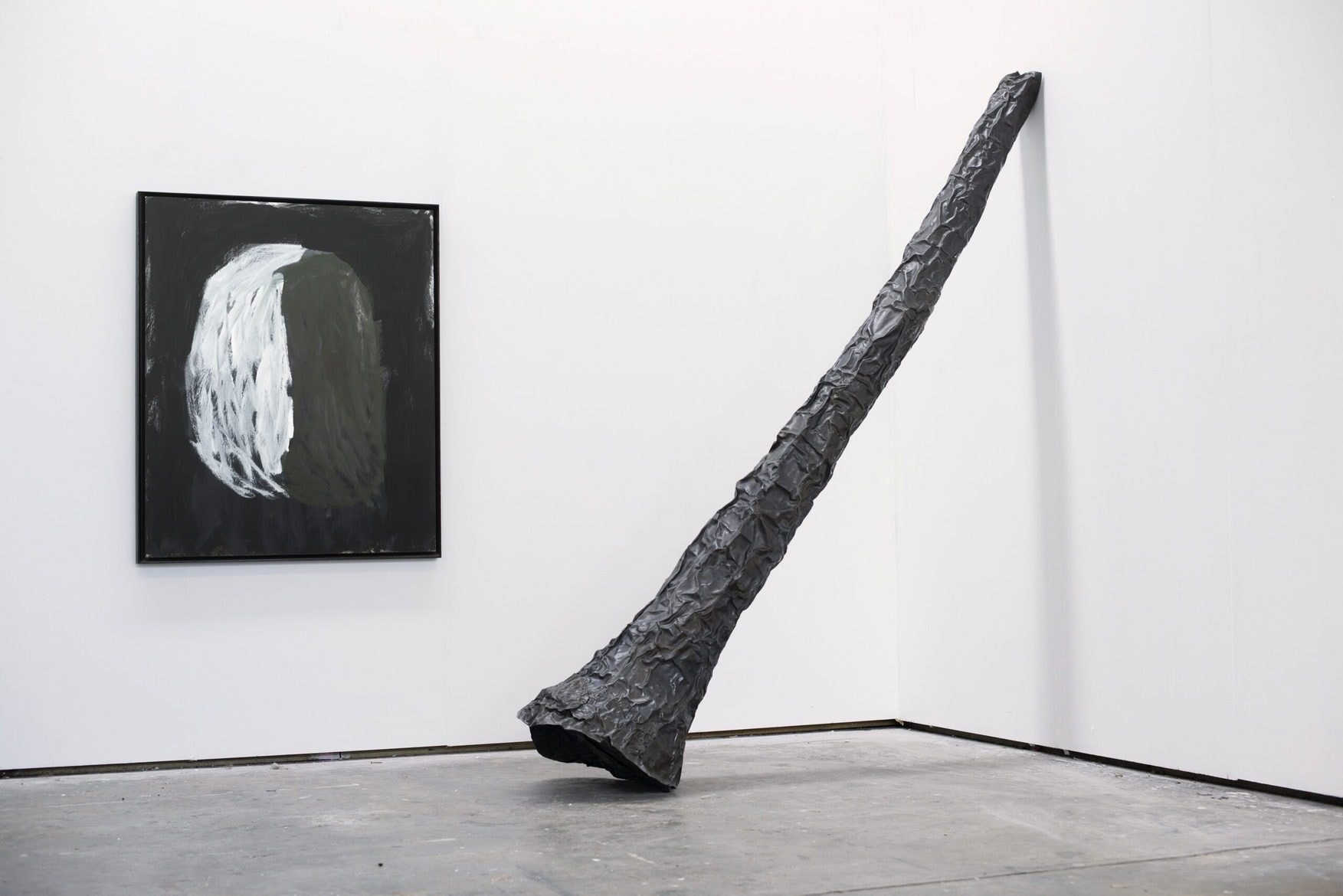Lottie Consalvo in 2021
When I look carefully / I see the nazuna blooming / By the hedge!
18.06. - 31.07.2021

Lottie Consalvo’s startling new works wrestle with the weight of nature on the human psyche and the weight of the human psyche on nature. She asks us, “Why don’t we walk in the bush at night? Why don’t we swim out on the seas in the dark?” In these abstract paintings and lead sculptures, she unravels our fear that these places might engulf us. She runs towards our neglect of the unknown and the ungovernable.
One night, Consalvo imagines the moon on fire. It burns and turns into coal, bristling black and dropping like a stone. Once it falls into the sea, it disappears in an anti-climactic apocalypse that simply leaves a void. This aching yawn reminds me of T.S. Eliot’s premonition that “This is the way the world ends / Not with a bang but a whimper.” Throughout this poem, Eliot’s fear of the unknown seems deeply but exclusively human, as if told ‘From the Viewing Tower’. Instead, Consalvo resists an anthropocentric view, creating spirited, banner-like canvases that confess ‘The Moon doesn’t see Me’; the moon begins and ends without me. In this, she acts like a harbinger or a mystic, acknowledging that although we need nature, it may not need us.
Consalvo has drawn the title of her exhibition from a haiku by poet Matsuo Bashō, pinpointing the profound weight of even the tiniest flower. In doing so, she reflects on how our imaginations intertwine with our responsibility to care for the natural environment that surrounds us. It’s as if she asks us to be moved by nature and give it pause at the same time, tearing open the wound of our inertia around the environment. Through the repeated exchange between layers and voids, she wonders whether we’ve completely lost touch, or are we just hiding?
Now imagine a falling tree while the moon is up, its body severing a passageway through the wilderness. To suspend this moment, Consalvo has sculpted a lead trunk that leans unbending against the wall. The folds and ridges of the mute metal seem both soft and toxic, both alive with the impressions of the artists’ hands and dead-weighted by the angle of its interrupted fall. This posture is reminiscent of a photographic self-portrait that Consalvo captured in 2015, where her own body, ramrod straight, is ‘mid-fall’. Viewing this black-and-white instant, we shudder at the anticipated impact. Now, we’re challenged to see this ‘Slow Fall’ of the tree with the same eyes. With this diagonal repeated over and over again in her paintings, Consalvo bonds passages in nature with psychological urgency.
Through relentlessly searching surfaces and reverent gestures, Consalvo arrives at a kind of spirituality that doesn’t believe in lives after, but instead lives intertwined. She tries to rob us of our psychological distance to nature’s terrible, fragile congress. Already terrible and fragile, humans now need to find new ways of taking part in an interconnected existence, perhaps by “walking through the trees on an unmade route [to] know we know nothing.” Emulating this, Consalvo taps into the invisible forces laying within the ‘Late Shadows’ that stretch a hollow in the solid soil, and in the fog that whispers along the water’s surface, telling of truths beyond the physical fact.
Always trusting the imagination more than the material, Consalvo even paints directly onto the wall, framing her turbid brushstrokes with hand-moulded lead. In this, she nods to architect Richard Leplastrier’s circular windows without glass—those that frame rather than shut out nature. She deploys the painted surface like a portal, inviting us back in (or back out). By combining ‘The Real, The Mystic and the Falling Tree’, she makes the fleeting still, the molten solid, and the faint indelible.
Finally, “maybe it’s just art on a wall and sculptures on the ground but, while you’re reading this, imagine a whale moving through the sea, because it all goes on without us while we stand here on this floor, between these walls and under this roof.”
Words by Alanna Irwin
Subscribe to our Newsletter
Sign up to be the first for exclusive gallery news, international events, opening information and updates on our artists.